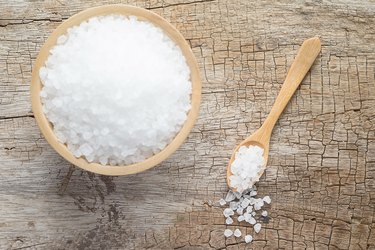
Do you experience dizziness after eating salty foods? It seems like everywhere we look there are people telling us to cut our salt intake. But what is salt? Salt is an electrolyte that helps regulate the water that is in and around your cells.
According to Harvard Health Publishing, we need the sodium in salt, but we consume too much. We only need less than one-tenth of a teaspoon of salt every day, and Americans get 20 times that much. If you're experiencing dizziness after eating salty foods it may be due to an underlying health issue and you should consult with your doctor,
Video of the Day
Video of the Day
Dizziness After Eating Salty Foods
Dizziness after eating salty foods could be caused by postprandial hypotension (low blood pressure after eating), according to Harvard Health Publishing. The body routes extra blood to the stomach and small intestines while the heart beats faster and blood vessels outside of the digestive system narrow.
In people with postprandial hypotension, the heart and blood vessels don't react this way, and that causes the drop in blood pressure after eating. The symptoms are dizziness, fainting, lightheadedness, falling, chest pain, nausea and sometimes vision problems. Postprandial hypotension can even cause ischemic attacks (mini-strokes).
Most of the time low blood pressure after eating is caused by high blood pressure, and high blood pressure can lead to stroke, heart attack and other cardiovascular conditions, according to the CDC. The treatment is to reduce your salt intake.
High Sodium Symptoms
High sodium means you have too much sodium in your blood and symptoms include excessive thirst, urinating less than usual, diarrhea and vomiting, according to MedlinePlus. High sodium is also known as hypernatremia. If you have these symptoms you may have an adrenal gland disorder, a kidney disorder or diabetes insipidus.
If you have these symptoms you need to call 911 and get a sodium blood test taken. If it is determined that you have high sodium levels the doctor will work with you to figure out what the diagnosis is. Sometimes high sodium levels can be caused by having diarrhea. The medical staff will then determine your treatment plan.
Low Sodium Dizziness
Low sodium means you have less than normal amounts of sodium in your blood. Symptoms include weakness, fatigue, confusion and muscle twitching, according to MedlinePlus. You may also experience low sodium dizziness. Low sodium is also known as hyponatremia. Low sodium levels could be caused by diarrhea, vomiting, kidney disease, Addison disease, cirrhosis, malnutrition and even heart failure.
If you have these symptoms you need to call 911 and get a sodium blood test taken, just like with the high sodium symptoms. It can mean something serious. The medical staff will work with you to determine the cause and map out a treatment plan.
Other Causes of Dizziness After Eating
There are some other health conditions that may be the cause of dizziness after eating.
Migraines and Meniere's Disease
People with vertigo or Meniere's disease often feel dizzy after eating certain foods. The Mayo Clinic states that Meniere's disease is an inner ear disorder. Vertigo is often a symptom of Meniere's disease. Trigger foods include anything with high salt content, alcohol and caffeine. If you have one of these conditions you will need to limit your salt intake to avoid feeling dizzy.
Non-Diabetic Hypoglycemia
While non-diabetic hypoglycemia is a rare condition, those who have it experience dizziness after eating due to a drop in blood sugar. The Mayo Clinic lists the symptoms as pale skin, fatigue, irritability, irregular heartbeat, hunger, crying out while sleeping and a tingling feeling around the mouth.
Dizziness can sometimes be caused by low or high sodium levels, and you should seek medical attention if you think you may have abnormal sodium levels because it can be a sign of something serious.
- Harvard Health Publishing: "5 Ways to Use Less Salt"
- Harvard Health Publishing: "Eating Can Cause Low Blood Pressure"
- CDC: "The Role of Sodium in Your Food"
- MedLinePlus: "Sodium Blood Test: MedlinePlus Lab Test Information"
- The Mayo Clinic: "Meniere's Disease Symptoms and Causes
- The Mayo Clinic: "Hypoglycemia Symptoms and Causes"
Was this article helpful?
150 Characters Max
0/150
Thank you for sharing!
Thank you for your feedback!


